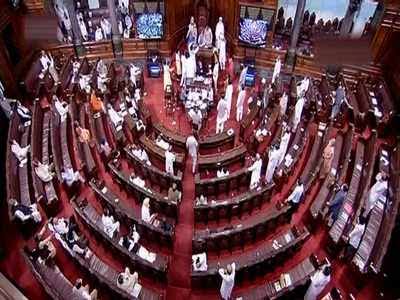The dubious voice vote to pass critical farm bills on the 20th of September severely destroyed democracy, claimed by the opposition. Rajya Sabha Deputy Chairman Harivansh Narayan Singh on Sunday passed two bills on the agricultural sector in a voice vote rather than calling for a division.
Division involves the physical separation of legislators and then counting their heads.
In India, this is achieved by getting MPs and MLAs to vote electronically. The other method should’ve been a voice vote where the chairman puts a question to the house and then ask members to put forward their opinion in the form of yes or noes. Based on which side was louder the Speaker decides if the motion was passed or failed through.
In case of a bill of such high-level importance, a division should have taken place so that results should not be disputed.
Not much surprise, crumpling democracy is the order of government. While the opposition was protesting the bill in the house the telecast was muted, cutting of viewers from what members of Parliament were saying.

This bill which is passed in both houses of Parliament squashed democracy. Passing the bill in haste is a significant decision in a fleeting moment of overzealous stubbornness that left permanent scars on democracy.
This bill garnered many protests from farmers which also became a cause for the resignation of the cabinet minister of Akali Dal, Harsimrat Kaur to raising voice in support of farmers by Bollywood singer-actor Daljeet Dosanjh.
Thousand of farmers are protesting on the streets and more than 250 agricultural outfits are planning to join in protest so far. Amidst all the chaos BJP is supporting its “historical bill “ and PM went on to say the opposition is “misleading” common people.No matter which side one chooses there is no denying that legislations are very important for the crores of Indians farmers. The scope of the legislation is wide, comprising a tightly-regulated farming sector as well as agricultural marketing to free-market forces.
The bills in question have been challenged on practical and constitutional grounds but that is a different debate. The flat out denial of a division was a new low in Parliamentary history. Farmers in Punjab and Haryana specifically have been protesting against the bills. They have expressed their discontentment that this bill would dismantle the minimum support price system and leave them at the mercy of big corporates.
The government of India governed by BJP claims to have the majority on its side but all of its Bill proposed and passed in Parliament are always under severe lashing by the general public. NRC-CAA also saw massive protests across the country by students, intellectuals, lawyers, academicians. One of the alleys of BJP Akali Dal also protested against the farmer bill in Parliament. In a situation where the opposition, as well as the BJP’s alliance partners, have raised doubts over the bill, how could this bill be passed through a voice vote?
Video footage of the bill being passed is discouraging. Not only that eight opposition members were suspended for one week while notice for a no-confidence motion against the deputy chairman was rejected by chairman M Venkaiah Naidu.
The rules of procedure and conduct of business in Rajya Sabha is quite clear “if the opinion so declared for a voice vote is again challenged, votes shall be taken by operating the automatic vote recorder or by members going into the lobbies”
“How will the (agriculture) Minister know which farmer sold his produce to which trader? How will he know the millions of transactions that will take place every day all over the country? If he does not have the data, how will he guarantee MSP is paid in every transaction?” the former Union Minister Shashi Tharoor said .
The bill which is termed as “black laws” by the opposition and has triggered protests by the farmers at several places requires a vote by division. If these are the issues they can be easily tackled by the government by being little flexible and accommodating towards opposition but governments refusal to allow a discussion on what the opposition considered to be an important issue or the passing of a controversial bill in haste, ignoring the opposition’s demand to refer the same to a committee for a detailed examination.
Now the bill is in the hands of President Ramnath Kovind to whom opposition has petitioned not to give assent to 2 bills passed by voice vote.
The Parliament system is designed in a way that the opposition has a say and the government has it’s. If the former is not given that due, Parliament as a democratic institution cannot sustain. There must be some sincere effort led by the executive to rehabilitate the effective and meaningful functioning of Parliament.